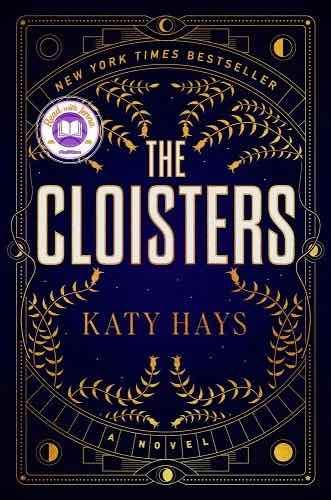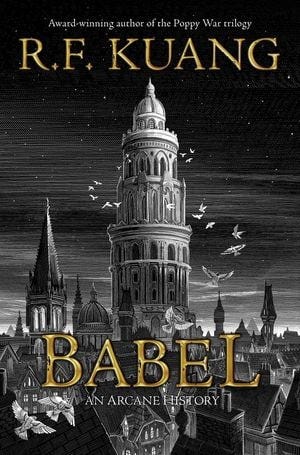I recently discovered, while browsing GoodReads, that there is a genre called dark academia. I had no idea. As it turns out, I read a lot of books in this genre. I suspect my love of the new Netflix hit, Wednesday, reflects this genre as well. Since two of my more recent reads share this category, I thought I would discuss them in one post.
The Cloisters, by Katy Hays
Atria Books, 2022
I was anticipating the release of this book. For some reason, I was under the impression it was a historical fiction book that jumps between timelines. It’s not that at all. It turned out to be a present day murder mystery. The book is narrated by Ann, who recently graduated from college in tiny Walla Walla, Washington.* Ann majored in art history and is seeking to complete a quality internship between her Masters and Doctorate programs, and she wants to get out of Walla Walla, which is also where she grew up. Through a series of unexpected events, she lands at The Met’s Cloisters in New York City. (The Cloisters focus on medieval art, architecture, and gardens.)

Ann is a researcher for Patrick, who is studying geomancy, history, and art revolving around a medieval deck of tarot cards. Another researcher is the beautiful, rich, and kind Rachel, with whom Ann becomes deeply entangled. Finally, Leo is the gardener, who is initially the love interest but that changes throughout the book’s twists and turns. I usually love twists and turns. However, I didn’t like the characters - any of them! - due to their attitudes and actions. After the final twist, I glanced back through some chapters, now knowing the full story, and I disliked the characters even more. In the GoodReads reviews, The Cloisters is either loved or hated. It was beautifully researched and had a great concept. I’m just not too sure about the execution.
My review: Meh
* Unrelated, but Walla Walla’s main street is filled with tasting rooms representing the surrounding, quite wonderful, Washington state vineyards.
Babel: An Arcane History, by R.K. Kuang
Harper Voyager, 2022
Wow!
I picked up this book because it was in the NY Times Book Review, which rarely steers me wrong. And again, they recommended accurately. Babel follows the life of a Chinese orphan taken to England, who takes the name of Robin Swift. He is raised to become a translator for the prestigious Royal Institute of Translation at Oxford, which is housed in a tower called Babel.
The book takes place in the 1800s in an alternate timeline from our own. Our world and the world in the book are incredibly similar, except that in Babel, the world runs on magic instead of machines. The magic is produced by using multiple languages expressing a word and then engraved on a piece of silver. Thus, the importance of language and translation.
Babel has fully realized characters and confronts uncomfortable topics such as colonialism, cultural appropriation, racism, labor and employee rights, and the privilege of academia. A Languages scholar herself, the author includes lectures on linguistics, etymology, and the art of translating to accurately express intent. Granted, I’m fascinated by those topics, but I believe this book would be interesting to anyone who loves to read. It races to an epic conclusion, a battle of good and evil as it might be seen through the lens of academia and government. I was sad when the book ended, and its characters and themes stayed with me for days.
My review:
The Wine: 2018 Darting Pinot Meunier
$18-$20
13.5% AbV
Pfalz, Germany
What wine to go with dark academia? What else but my favorite red grape? It’s hard to find Pinot Meunier on its own, because of its relationship to champagne. Pinot Meunier often partners with Pinot Noir and Chardonnay as the primary grapes that make up sparkling wine. In this instance, the grape is fermented with skins on, producing an enjoyable, ruby-red still wine.
I recently found a new-to-me wine shop, and the staff is incredibly knowledgeable. (My imposter syndrome returns whenever I go in.) I was thrilled to find they included this wine in their December wine club release. Initially, I tasted a lot of plum on the palate. That was followed by cranberries and cedar. It’s an earthy wine.* It’s also tannic, but the tannins are soft and balanced - enough to let you know they are there, but not enough that I was smacking my tongue trying to shake them. The finish is spicy, which was a pleasant surprise.
My review: I’d buy it again - it’s a great example of my favorite red grape.
*When I refer to “earthy,” I don’t mean I taste dirt. It’s more that I taste the way the soil in which the wine was grown affected the end result. When you can taste the place, it is called terroir.
It looks like Thursdays are officially the day I’ll be sending out the newsletter each week, so make sure to check your inbox one week from today! I’ll close us out with a photo of Ringo by the Christmas tree.
Cheers,
Michelle
xoxo









Babel sounds killer.
I just received my copy of Babel so am glad to read such a glowing review! Also will try to find some of that wine.